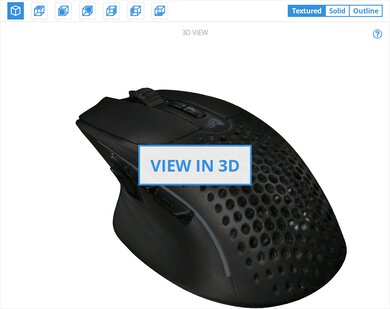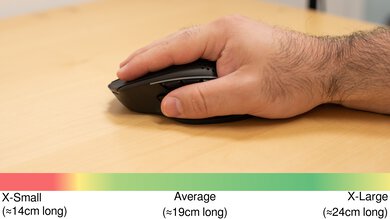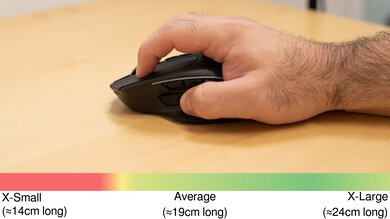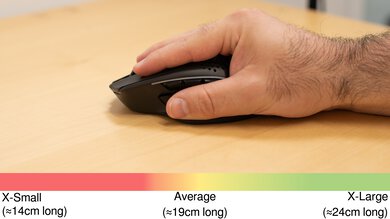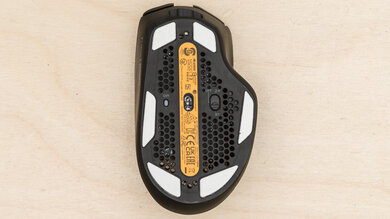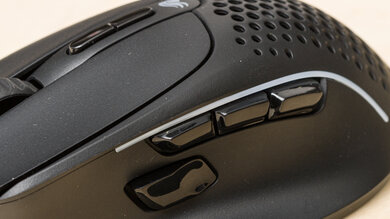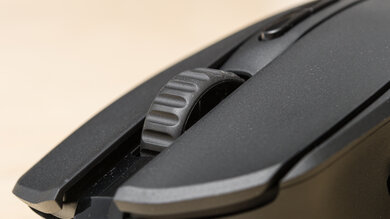The GLORIOUS Model I 2 Wireless is a wireless gaming mouse with a right-handed design that continues GLORIOUS' Model I lineup of lightweight, multi-genre mice. Like its wired predecessor, the GLORIOUS Model I, this model has the same right-handed shape and a set of four programmable side buttons. Two of these side buttons are modular, allowing you to swap them out for alternate button shapes. Apart from adding wireless connectivity, this new model also uses the newer GLORIOUS BAMF 2.0 sensor.
Our Verdict
The GLORIOUS Model I 2 is a decent mouse for work. It has a comfortable, right-handed design with a thumb rest and an impressive number of programmable buttons. You can connect this mouse wirelessly with its USB receiver or via Bluetooth. Unfortunately, the scroll wheel lacks L/R tilt functions and a free-scrolling mode.
- Impressive build quality.
- Connects wirelessly via its USB receiver or Bluetooth.
- Scroll wheel lacks a free-scrolling mode and left/right tilt inputs.
The GLORIOUS Model I 2 is a great FPS gaming mouse overall. Still, its wireless click latency is only satisfactory and quite inconsistent, making it better suited for casual rather than competitive play. It has impressive build quality and is very lightweight, especially considering its size and 'ergonomic' right-handed shape with a thumb rest. It also has excellent sensor performance and outstanding feet that glide smoothly on mousepads and desks.
- Very lightweight.
- Impressive build quality.
- Excellent all-around sensor performance.
- Wireless click latency is satisfactory for casual gaming but too high for fast-paced, competitive gaming.
The GLORIOUS Model I 2 is a great mouse for MMO gaming, though it has fewer programmable side buttons than most dedicated MMO gaming mice. That said, it has impressive build quality and a comfortable right-handed shape. It also offers excellent sensor performance, though unfortunately, its wireless click latency is only satisfactory and quite inconsistent.
- Very lightweight.
- Impressive build quality.
- Excellent all-around sensor performance.
- Impressive number of programmable buttons.
- Wireless click latency is satisfactory for casual gaming but too high for fast-paced, competitive gaming.
- Fewer programmable buttons than most dedicated MMO mice.
The GLORIOUS Model I 2 has outstanding sensor accuracy and excellent sensor latency performance. Unfortunately, it's limited in competitive scenarios by its wireless click latency, which is fairly high and quite inconsistent, making it only satisfactory for casual gaming.
- Outstanding sensor accuracy.
- Excellent overall sensor latency.
Changelog
- Updated Aug 19, 2025: We've converted this review to Test Bench 1.5.1. This update removes less relevant or redundant elements, including several videos. We've also adjusted our Sensor Latency testing, resulting in minor score changes. See our full 1.5.1 changelog for details.
-
Updated Nov 14, 2024:
We've added a link to the newly reviewed Razer Basilisk V3 Pro 35K in the Click Latency section.
- Updated Jan 05, 2024: We've updated the CPI graph displayed in the Sensor Latency section of this review. Our results remain the same, but these graphs have two new columns with results from the Delay At Half Movement and Delay To End Of Movement tests.
- Updated Dec 07, 2023: We've converted this review to Test Bench 1.5. This update adds a new Main Button test group, which provides button actuation data and switch information. We've also made minor changes to how we calculate the Office usage score. For more details, you can see our full changelog here.
Check Price
Differences Between Sizes And Variants
The GLORIOUS Model I 2 Wireless is available in Black or White colorways. There are no variants at the time of writing. We bought and tested the black color model. You can see the label for our unit here.
Though not a variant, there's also an earlier wired model of this mouse that we've tested separately called the GLORIOUS Model I.
Popular Mouse Comparisons
The GLORIOUS Model I 2 Wireless is a wireless gaming mouse that continues GLORIOUS' Model I lineup of multi-genre models. This mouse shares a similar right-handed shape to other popular multi-genre options, including the Logitech G502 X PLUS and the Razer Basilisk V3 Pro. Unlike these mice and most other multi-genre options, the GLORIOUS is significantly lighter. This lightweight construction is more common for smaller, dedicated FPS mice that typically don't have a thumb rest or as many programmable buttons. Unfortunately, while this mouse's sensor performance is excellent, its wireless click latency is lacking, making it better suited for playing casually rather than competitively.
For more options, see our recommendations for the best mouse, the best wireless gaming mouse, and the best lightweight mouse.
The GLORIOUS Model I and the GLORIOUS Model I 2 Wireless are gaming mice in the same product lineup with a very similar right-handed shape. The Model I is an earlier wired-only model. It's marginally lighter but has significantly better click latency performance and has RGB lighting zones on both sides and in the scroll wheel. Its body has weight-saving, honeycomb-shaped cutouts on the palm rest and underside. On the other hand, the GLORIOUS Model I 2 Wireless is a wireless model with better sensor accuracy. While it lacks an RGB lighting zone in the scroll wheel, it has comparatively smaller circular-shaped weight-saving cutouts on the palm rest and underside.
The Razer Basislik V3 Pro and the GLORIOUS Model I 2 Wireless are wireless gaming mice with similar right-handed shapes and thumb rests. The Razer has better build quality and significantly better click latency performance. It also has more extensive RGB lighting, and its scorll wheel has a free-scrolling mode and left/right tilt inputs, which the GLORIOUS' scroll wheel lacks. On the other hand, the GLORIOUS is significantly lighter, in part thanks to the small circular cutouts in its palm rest and underside.
The Logitech G502 X PLUS and the GLORIOUS Model I 2 Wireless are wireless gaming mice with similar right-handed shapes that feature thumb rests. The Logitech feels better built and has significantly better click latency. It also has a scroll wheel with both a free-scrolling mode and left/right inputs— features that the GLORIOUS lacks. On the other hand, the GLORIOUS is significantly lighter, in part due to having circular weight-saving cutouts on its palm rest and underside.
The GLORIOUS Model O 2 Wireless and the GLORIOUS Model I Wireless are wireless gaming mice. The Model O 2 Wireless has a symmetrical shape and is somewhat lighter. On the other hand, the Model I 2 Wireless has a right-handed shape with a thumb rest. It has more programmable buttons, including four side buttons, two of which are modular. Both mice have similarly high-end sensor performance but only satisfactory click latency.
Test Results

The GLORIOUS Model I 2 looks similar to its wired predecessor, the GLORIOUS Model I. It has a matte black body and the same right-handed design with a thumb rest and four glossy side buttons. However, there are subtle differences in the curves and angles compared to the wired Model I. This mouse has a somewhat sleeker, more aggressive look overall.
Unlike the wired Model I, which has larger honeycomb-shaped weight-saving cutouts on its palm rest and underside, the wireless Model I 2 has smaller circular-shaped cutouts.
This mouse has a strip of RGB lighting on either side. You can customize these two lighting zones using the configuration software—but they aren't independently addressable. Also note that, unlike the wired Model I, this mouse lacks an additional RGB zone in the scroll wheel.
This mouse shares virtually the same dimensions as the wired GLORIOUS Model I. There are some extremely minor differences in how several surfaces are curved, so the measured dimensions are slightly different.
This mouse has impressive build quality. The body feels sturdy, and there aren't any loose or wobbling parts. However, there's a bit of flexibility in the plastic side panel on the left side of the mouse, and if you squeeze with concerted effort into this panel, it's possible to actuate the side buttons. That said, it is very unlikely to create any issues when using the mouse normally unless you forcefully squeeze your mouse.
The two modular side buttons are held in with magnets and feel quite secure but are also easier to remove compared to the wired GLORIOUS Model I, which has magnetic buttons that are quite difficult to remove.
We also noted during testing that it's possible to actuate the middle mouse click button if you intentionally press the mouse wheel to the right side of its housing, but once again, this isn't likely to happen during everyday use.
This mouse is very lightweight and easy to move quickly and accurately. It's significantly lighter than similar wireless multi-genre models that share the same overall shape, including the Logitech G502 X PLUS and the Razer Basilisk V3 Pro.
The wireless GLORIOUS Model I 2 shares the same overall shape as the wired GLORIOUS Model I, but there are very small differences in how some surfaces are angled and curved. That said, the two mice feel extremely similar in hand.
This mouse has a right-handed design with a thumb rest for added support. It feels comfortable to use, but it's slightly on the larger side, so if you have small or extra small-sized hands, you may want to look for a smaller option as you'll have difficulty reaching the side buttons closest to the front of the mouse.
GLORIOUS advertises a maximum battery life of 110 hours when connected with its 2.4Ghz receiver or up to 210 hours via Bluetooth—which is on the high end of the battery life spectrum for current gaming mice at the time of writing.
While not explicitly mentioned on the GLORIOUS product page, these maximum battery life figures are very likely only attainable with RGB lighting turned off.
This mouse includes a lightweight and flexible paracord-like charging cable. It feels very similar to the cable on other recent GLORIOUS releases and glides smoothly across desks without dragging. However, it retains some minor kinks from its packaging.
This mouse has exceptionally good feet that glide very smoothly on mousepads and even desks. The feet are slightly thicker than those on many similar gaming mice, and although they have some sharp corners, it doesn't noticeably affect their gliding performance.
- GLORIOUS Model I 2 Wireless
- USB-A to USB-C cable
- USB-A receiver
- USB receiver extender
- 3x alternate side buttons (2x alternate thumb buttons and 1x alternate rearmost side button)
- 2x 'Blank' side button pieces (one for the thumb button and one for the rearmost side button)
- Side button removal tool
- User documentation
- Stickers
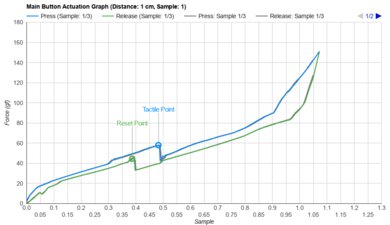
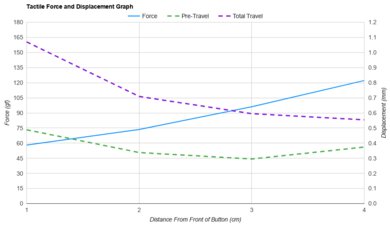
You can reprogram all buttons on this mouse, including the left- and right-click buttons. There's a non-programmable power/connectivity mode switch on the underside.
Two of the four side buttons on this mouse are modular: the 'thumb button' closest to the front and the side button closest to the mouse's rear. You can see an image of these buttons here.
The buttons are held in with magnets, and you can remove and replace them with alternate button shapes or blank plastic pieces that sit flush with the body, effectively 'disabling' the button. The 'thumb button' has two alternate button shapes and a blank, while the back button has one alternate shape and a blank.
This mouse also has a feature that GLORIOUS calls 'Layer Shift,' which allows you to designate a shift button to toggle to a secondary layer of controls.
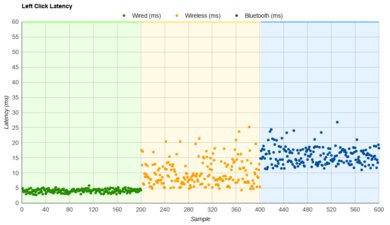
The GLORIOUS Model I 2 has satisfactory click latency, making it well-suited for playing casual titles. However, its wireless click latency is noticeably inconsistent and too high for playing fast-paced competitive games.
If you're looking for a similar mouse with better click latency, check out the Razer Basilisk V3 Pro 35K.
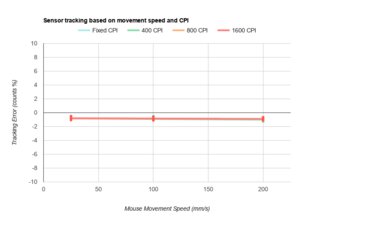
The GLORIOUS Model I 2 offers exceptionally good CPI performance. Its sensor delivers outstanding tracking accuracy, and the physical movements you make with your mouse translate extremely close to your cursor movements on-screen.
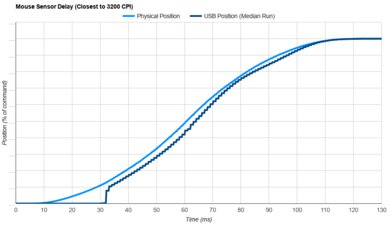
The GLORIOUS Model I 2 offers excellent overall sensor performance. The timing of the physical movements you make with this mouse is matched very closely to those you see on screen.
This mouse does have slightly elevated Delay to Start of Movement results. This means the sensor takes slightly longer to react when you begin moving your mouse. This added delay is extremely minor, and while it's noticeable in slow-motion footage, it isn't noticeable during normal use. That said, the added delay can still have an imperceptible effect—but this is only an issue if you mainly play fast-paced, competitive games where even split milliseconds count.
We performed these tests at the maximum polling rate of 1000Hz and with Motion Sync disabled. Motion Sync is a setting that attempts to synchronize the timing of sensor data to USB polling events to your computer, but it typically adds a small degree (~1 ms) of sensor latency.
This mouse uses a Glorious BAMF 2.0 sensor. Using the configuration software, you can adjust CPI, lift-off distance, motion sync, and polling rate settings. The polling rate options are 125Hz, 250Hz, 500Hz, and 1000Hz.
The scroll wheel has a grooved rubber grip and operates fairly quietly. It feels precise and has a moderate definition between steps. Compared to the wired GLORIOUS Model I, the scroll wheel rotation feels stiffer, and the middle click button requires slightly more force to actuate.
The left- and right-click buttons, side buttons, and scroll wheel are all fairly quiet and unlikely to bother those around you.
The GLORIOUS Model I 2 uses the Glorious Core software. It has a clear interface and is straightforward to navigate and use. It allows you to change expected settings, including button assignments, CPI, lift-off distance, debounce time, motion sync, polling rate, and RGB lighting. You can also record macros and save your custom settings to the onboard memory.


